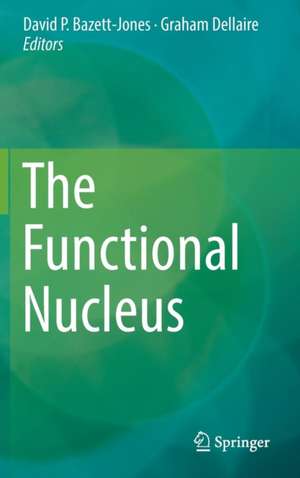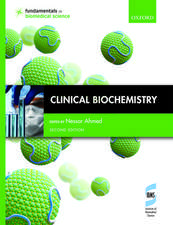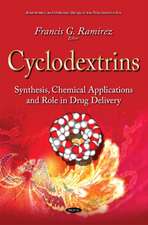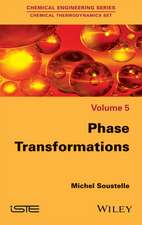The Functional Nucleus
Editat de David P. Bazett-Jones, Graham Dellaireen Limba Engleză Hardback – 25 oct 2016
| Toate formatele și edițiile | Preț | Express |
|---|---|---|
| Paperback (1) | 1227.36 lei 6-8 săpt. | |
| Springer International Publishing – 23 iun 2018 | 1227.36 lei 6-8 săpt. | |
| Hardback (1) | 1233.52 lei 6-8 săpt. | |
| Springer International Publishing – 25 oct 2016 | 1233.52 lei 6-8 săpt. |
Preț: 1233.52 lei
Preț vechi: 1504.29 lei
-18% Nou
Puncte Express: 1850
Preț estimativ în valută:
236.04€ • 252.40$ • 196.80£
236.04€ • 252.40$ • 196.80£
Carte tipărită la comandă
Livrare economică 18 aprilie-02 mai
Preluare comenzi: 021 569.72.76
Specificații
ISBN-13: 9783319388809
ISBN-10: 3319388800
Pagini: 654
Ilustrații: VI, 513 p. 56 illus., 48 illus. in color.
Dimensiuni: 155 x 235 x 29 mm
Greutate: 0.9 kg
Ediția:1st ed. 2016
Editura: Springer International Publishing
Colecția Springer
Locul publicării:Cham, Switzerland
ISBN-10: 3319388800
Pagini: 654
Ilustrații: VI, 513 p. 56 illus., 48 illus. in color.
Dimensiuni: 155 x 235 x 29 mm
Greutate: 0.9 kg
Ediția:1st ed. 2016
Editura: Springer International Publishing
Colecția Springer
Locul publicării:Cham, Switzerland
Cuprins
Part I - Nuclear Periphery.- 1.Laminopathies/Howard Worman.- Part II Nuclear Bodies.- 2.Nucleolus/Marie-Line Dubois and François-Michel Boisvert.- 3.Speckles/splicing and disease/Michael Ladomery and Sebastian Oltean.- 4.PML, cancer and stem cells/Julia P. Hofmann and Paolo Salomoni.- Part III Chromosomes.- 5.Chromosome territories/Karen J. Meaburn, Bharat Burman and Tom Misteli.- 6.Telomeres and Chromosome Instability/Tsz Wai Chu and Chantal Autexier.- PART IV Nuclear Domains and Development.- 7.Polycomb bodies/Vincenzo Pirrotta.- 8.Ikaros domains/Karen E. Brown.- PART V Nuclear Domains and Cell Stress.- 9.Senescence/SAHFs/Tamir Chandra.- 10.DNA repair foci as facultative nuclear domains/Michael J. Hendzel and Hilmar Strickfaden.- 11.DNA damage and the nucleus/Jordan Pinder, Anastazja Grabarz, Evi Soutoglou and Graham Dellaire.- 12.Inflammation and the nucleus/Sona Hubackova , Simona Moravcova and Zdenek Hodny.- 13.Viral infection and the nucleus/Lori Frappier.- PART VI Macromoleculardynamics within the nucleus.- 14.Actin filaments/motors/Guillaume Huet and Maria K. Vartiainen.- 15.Molecular diffusion/Alexander Gansen and Jörg Langowski.- PART VII Chromatin transactions and epigenetics.- 16.Fibres/interactions/Christopher J.F. Cameron, James Fraser, Mathieu Blanchette, and Josée Dostie.- 17.DNA replication Sebastian Müller, Dan Filipescu and Geneviève Almouzni.- 18.Development and Epigenetics Nuphar Salts and Eran Meshorer.- 19.Epigenetics and disease/Sanaa Choufani and Rosanna Weksberg.- PART VIII Transcription and RNA metabolism.- 20.Transcription factories/Christopher Eskiw and Jenifer Mitchell.- 21.RNA transport Jonathan Sheinberger and Yaron Shav-Tal.
Notă biografică
David P. Bazett-Jones
The Hospital for Sick Children, Toronto, ON, Canada
Graham Dellaire
Dalhousie University, Halifax, NS, Canada
Textul de pe ultima copertă
This book gives an in-depth overview on nuclear structure and function. It clearly shows that the epigenome and the three-dimensional organization of the nucleus are not independent properties. The intimate relationship between the location and the epigenetic modifications of gene loci is highlighted. Finally, it shows that the complex three-dimensional organization of the nucleus is not just of academic interest: The structure, composition and function of virtually all of the sub-nuclear compartments identified so far can be implicated to a list of human genetic diseases. Hence, a detailed elucidation of how these domains are assembled and function will provide new opportunities for therapeutic intervention in clinical practice.
Caracteristici
Provides a state-of-the-art review on nuclear structure and functions Highlights the relation between epigenomics and nuclear architecture Gives an outlook on possible medical applications













